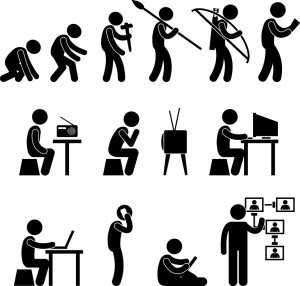Extending the Evolution of Language | Why Social Lingo Works
 I’m a big fan of language and its evolutionary history. Language is never constant. Instead, it is always evolving to meet modern requirements, which include social needs and tools. Contrary to some grammarians, I believe that creating lingo is a natural evolution of human communication, not something that discredits the English language.
I’m a big fan of language and its evolutionary history. Language is never constant. Instead, it is always evolving to meet modern requirements, which include social needs and tools. Contrary to some grammarians, I believe that creating lingo is a natural evolution of human communication, not something that discredits the English language.
The Beginnings
Human language evolved from humble beginnings. Here is a simple summary of the origins of language evolution: Sounds -> Shapes -> Context -> Comprehension
An apple is known to be an apple no matter what word is used to represent it in any language once we know what the word is and what it represents. This ability to relate sounds and words to real-life objects and methods forms the basis of what language provides for all human beings: a way to connect and communicate effectively with others.
The Changing Forms
The forms and methods of using language provide greater convenience to compose and communicate faster. Here’s a simple historic lineage of the changing forms of correspondence over time:
Writing Letters -> Telegraph (Morse Code) -> Typewriters -> PCs -> Word processors (spell check) -> Email -> SMS (word prediction and error correction) -> IM
The nature of these forms is dictated by the expectancy of their delivery. Letters took a few days or weeks to deliver by mail. Telegraphs sped up delivery, but required conversion into electronic representations. Typewriters and word processors made it easier and faster to compose and correct correspondence, which also translated into email for immediate delivery (although passive receipt/viewing).
Next came mobility: being able to correspond while on the go. This form offered less time to communicate, but doing it effectively required a broader scope and context within a short, rapid message. Unlike email, mobility transformed SMS and IM from passive communication to real time. It connected everyone everywhere—anytime and all the time—creating a social need for all to be reached and reach out while on the move.
Language is implicitly determined to match the way it needs to be used for certain purposes. For example, news reporters previously had to use shorthand to capture more than 60 spoken words per minute, while today they rely on miniature digital recorders that can play words back to transcribe more accurately and comfortably at a more convenient time. Courtrooms use stenotype machines to capture over 225 spoken words per minute by more than one person speaking at a time.
Electronic methods convert language into bits and bytes over wires or waves. But the actual content has also changed to meet the nature of its use. For instance, all of the major sciences use shortened representations to reflect what would otherwise be cumbersome constructions. Mathematical equations like E=MC2 are abbreviated versions of a very long, convoluted formula. What’s more, the use of acronyms is widespread in all market sectors, from the military and government through the field of education.
Mobility requires rapid communication in every sense, from composition and representation through delivery methods. Since the receiver’s response rate is expected to be almost immediate as well, this enforces the need to write quick messages made more efficient by the use of social lingo.
The next generation may be messaging with lingo, but they may also become the first to talk lingo as well. The payoff will be the ability to share newly created lingo and language such that it becomes common knowledge, with each message accurately translated. We built Cyfr for just that reason: to extend the evolution of language even further for the next generation.








